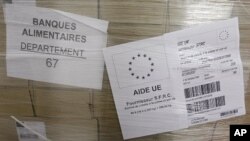European Union governments consider next week whether to cut a food aid program benefitting more than 13 million poor people. Those supporting the cuts argue that national governments should provide the food assistance. But charities warn the proposed cuts would be disastrous for some of Europe's most vulnerable residents - at a time of growing austerity.
The small office of French charity "Secours Populaire" in the Paris suburb of Boulogne is packed one recent afternoon. A sampling of France's poor - young and old, immigrants and native French - file in to receive weekly distributions of meat, pasta, dairy products - and chocolate for the children.
They include Stephania Grigoras, a 25-year-old illegal immigrant from Romania, who is here with her three-year-old daughter Beatrice.
A single mother of three, Grigoras says the food she receives from Secours Populaire is very important because she can't find a job. It helps her family eat. And the volunteers at this office listen to her problems.
Marc Antoine Vadelorge, 24, also depends on the distributions. Not so long ago, he was a fisherman in Normandy. But earlier this year, he quit the family business and headed to Paris to find work.
"The price of the fish is down, the gazoil [fuel] is up and it's more difficult to pay what you have to pay when you're a fisherman," said Vadelorge. "And when you have your check at the end of the week of fishing, it's not very good."
Secours Populaire is among scores of European charities that depend on the European Union for food aid. But EU members are divided whether to slash the food aid program. The assistance traditionally depended on surplus food supplies. But supplies are down, and some countries argue that national governments, and not Brussels, should pay for the poor.
Secours Populaire's President, Julien Laupretre, says cutting the EU aid would be disastrous.
Laupretre says there are some people who only eat thanks to the food aid. Without EU assistance, he says, Secours Populaire will be forced to cut its food distributions in half.
The proposed food cuts come as Europeans are spending less across the region in response to the debt crisis.
That's the case in France, where government spending cuts sent thousands of protesters to the streets this week. France is among the countries arguing the EU food aid should be maintained.
Secours Populaire's Laupretre says hard times have already arrived. He says the number of people receiving the charity's handouts has increased steadily, to roughly 2.4 million so far this year.
Laupretre says Europe's debt crisis is particularly affecting young people, single parents, children, immigrants and the working class. Most worrying, he says, are the increasing numbers of old people seeking food assistance.
European agricultural ministers are expected to discuss the proposed aid cuts when they meet later this month.
EU Proposed Cuts in Food Aid Could Affect Millions
- By Lisa Bryant




